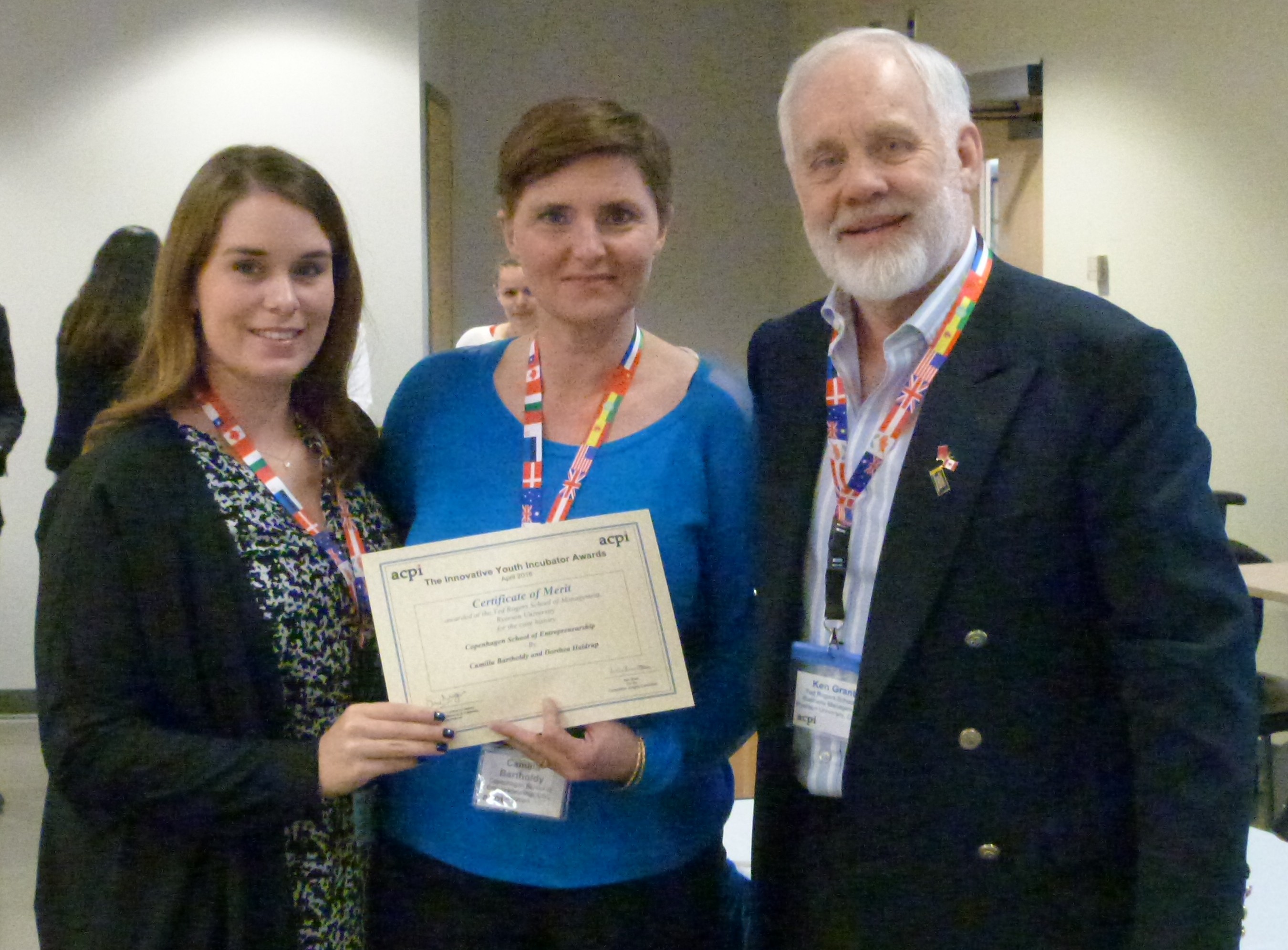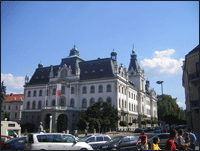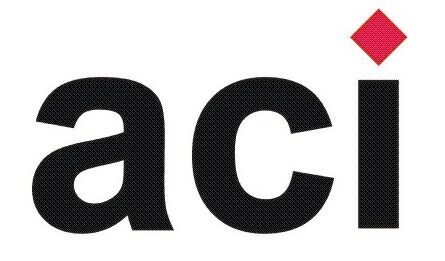Innovative Youth Incubator Awards
The International Conference on Innovation and Entrepreneurship (ICIE) is a forum where academics can exchange their research and experiences in their fields. At the fourth ICIE in Toronto in April 2016, a new award was established – the Innovative Youth Incubator Awards. This award recognizes creative and innovative approaches to the development of young entrepreneurs. Twenty seven submissions were made for the first award, of which eight were shortlisted and agreed to present at the conference. The eight submissions and illustrate a wide range of approaches that have been taken to develop young entrepreneurs. They come from seven countries — Denmark, Sweden, France, USA, Cairo (with links to Germany), Uganda and Ghana.
We look forward to an interesting competition again next year in Kuala Lumpur where the Conference Chair is Assoc. Prof. Dr. Kamarulzaman Ab. Aziz.
A collection of case histories from the finalists of the awards is avaible to purchase now from http://www.academic-bookshop.com
Innovative Youth Incubator Awards 2016: An Anthology of Case Histories
Edited by Kenneth A Grant
ISBN: 978-1-910810-88-0
Youth Incubator Awards Winners
Camilla Bartholdy and Dorthea Haldrup Nielsen
Copenhagen Business School
Call for Research Methods Books
Have you written a book on Research Methodology that you would like to publish? or would you like to edit a book on this topic? ACPIL is looking for authors and editors of research methodology topics. For more information on what is involved please e-mail dan.remenyi@academic-publishing.org.
Summer in Europe’s Green Capital
On 16th-17th June this year the 16th European Conference on eGovernement (ECEG 2016) will be held in Ljubljana, Slovenia which has been named Europe’s Green Capital for 2016. The European Green Capital is a European Commission initiative. The title of ‘European Green Capital’ is awarded annually and it promotes and rewards the efforts of cities that are committed to improving the urban environment.
The city of Ljubljana was awarded this status after they successfully changed the city’s infrastructure to move away from the overuse of cars and instead provide an efficient public transport system. They continued this further by pedestrianising the centre of the city and encouraging people to walk where possible.
The 16th European Conference on eGovernement (ECEG 2016) will be hosted by the University of Ljubljana, Slovenia on 16th-17th June.
Proof Reading Service
When it comes to publishing your research, most academics are looking to get a wide reach of their work. One way to help with this is to publish in English conference proceedings and journals. By publishing in English you are able to reach readers from all over the world.
To help with this we have established a proof reading service which can be of great help to those writing in English as their second language.
To find out more about this please email: elaine@academic-conferences.org
Electronic Journal of Information Systems Evaluation
Volume 19 Issue 2 of the Electronic Journal of Information Systems Evaluation (EJISE) has recently been published. This issue is comprised of a selection of papers further developed from submissions to the 9th European Conference on IS Management and Evaluation (ECIME 2015). This special issue of the journal was edited by Elias Pimenidis and can be read here: http://www.ejise.com/volume19/issue2
Video of the Month
In qualitative research a central issue is how to handle evidence or data in the form of text or other non-quantitative representations. Hermeneutics is an important approach to the understanding of textual data. It is also a major challenge to novice researchers who often find it difficult to get their minds around the subject. Paul Fry’s presentation on this subject is one of the clearest introductions available to hermeneutics and it is therefore a great place to start to learn about this approach to data understanding. However it needs to be noted that this video is only a starting point as to become a competent exponent of hermeneutics requires the development of a considerable understanding and skill level. Paul Fry is a distinguished academic from the Department of English at Yale University.
Research Around the World
Researcher and Institution
Description of project
John Suler, Psychology Department, Science and Technology Center, Rider University, USA
To see website click here
email: John Suler
Cyberpsychology Architecture
This research explores “cyberpsychology architecture” as an interdisciplinary model for understanding and designing digital environments. How people react to a particular online environment depends on how that particular environment is constructed from the eight fundamental dimensions of cyberpsychological architecture. These dimentions include: identity (presentation of self); social (relationships and groups); interactive (human computer interaction); text (long and short forms of text communication); etc. The history of the internet has taught us that the power of cyberspace is its potential to isolate, minimize, enhance, manipulate, and combine these dimensions in surprisingly unique and useful ways.
Dr. Broto Rauth Bhardwaj,Head, Entrepreneurship, Innovation and technology management Cell, Bharati Vidyapeeth University, New Delhi
email: Broto Rauth Bhardwaj
Strategic Alliance between emerging, developing and developed countries: Circular Economy Model (CEM) for sustainable growth opportunities
The purpose of the research project is to find the role of sustainable technologies, process and capabilities for creating sustainable solutions for present day problems including economic growth, challenges for inclusive education, pollution, business growth and social inclusion others.The research will value add to the existing literature by development a sustainable circular economic model.
We are looking forward to collaboration with the other research organisations for furthering the cross country research sustainable circular economic c model.
Dr. Susan Crichton University of British Columbia and Dr. Lilian Vikiru formerly Institute of Educational Development – Aga Khan University
To see website click here
email: Susan Crichton email: Lilian Vikiru
Leapfrogging Pedagogical Challenges: Using Appropriate Technology to Foster Innovations in Literacy for the Knowledge Age
This two year funded research introduced the Maker Movement to educators in rural Tanzania. A tangible result of the project was a resource in both English and Swahil.
Dr Hamadoun I. Touré, Secretary-General, International Telecommunication Union
To see website click here
email: Kim Andreasson
Digital Divides: The New Challenges and Opportunities of e-Inclusion
“Twenty-five years after the introduction of the Internet, more people around the world are offline rather than online. Given the opportunities of a digital society, it is time to reassess old challenges to bridge the access gap and analyze emerging concerns towards greater e-inclusion. I’m pleased that Kim Andreasson, as an e-government adviser to the United Nations for more than a decade, helps to raise awareness of these issues and I am confident that the information contained within this volume will help to further bridge digital divides.”
Dr. Chris Flaherty, University of Wollongong, Australia
To see website click here
email: Dr. Tony Green
Behavioural Model for Terrorist TTPs (Tactics, Techniques, and Procedures)
A model of individual behaviour used for simulation of terrorism within populations. Drawing from psychodynamics, and terrorism literature, to identify linkages between people’s personalities, beliefs and interactions; with individuals, groups and society. Based on interactions between various traits in the dimensions that determine the behaviour for an individual, within a population simulation.
Eric Legale and Matteo Satta, Issy Média, France
To See website click here
email: Matteo Satta
Issy-les-Moulineaux and ISEP: fostering R&D to boost innovation
The City of Issy-les-Moulineaux has recently settled a collaboration with the prestigious schoolsISEP and Ecole des Ponts but also with the CNRS to foster Open Innovation. This settlement has represented an important event for the City as both organizations have soon started collaborating on different events and planning common interest activities.
Danilo Piaggesi, Managing Director, FRAmericas
To see website click here
email: Danilo Piaggesi
Monitoring progress in deployment of science, technology & innovation for the United Nations sustainable development goal n. 17
FRAmericas is implementing U.N.SDG17 in the area of “ICT for development”, developing baseline data for selected target indicator;constructing a database to collect, verify and register activities of governmental and non-governmental organizations; creating an open platform to which registered organizations can access and contribute their inputs to the monitoring process.
Prof. Srikanta Patnaik,
Department of Computer Science and Engineering, SOA University, Bhubaneswar, Odisha, IndiaTo see website click hereemail: Srikanta Patnaik
Nature Inspired Computing for Optimization and Management
The aim of Nature Inspired Computing is to develop new computing techniques after getting ideas from nature’s behavior. It is a computing system operated by population of autonomous entities surrounded by environment. This computing has a repository of local behavior rules, which are crucial to autonomous entity and capable of learning. These techniques are applied in science, engineering, as well as economics and management.
